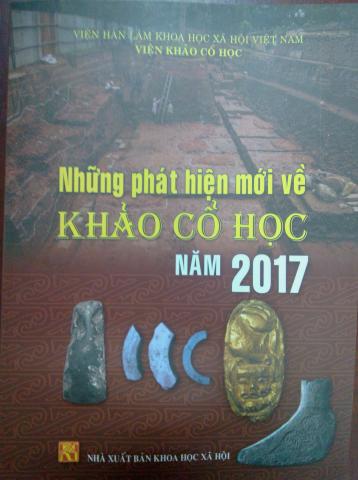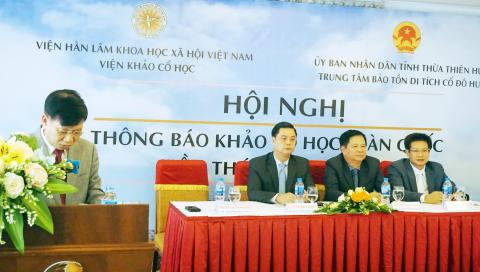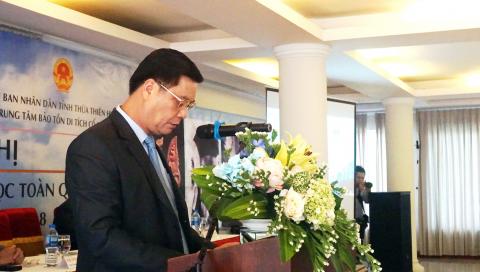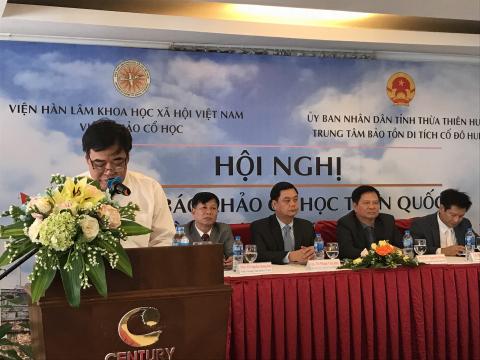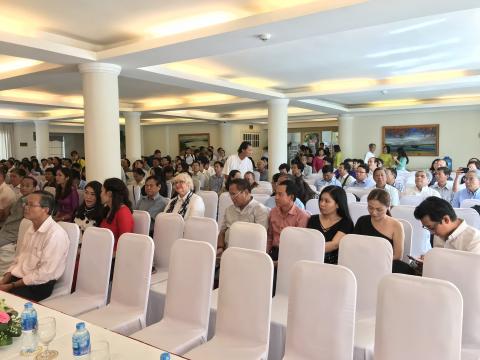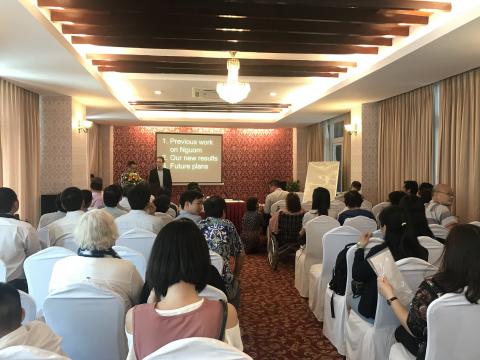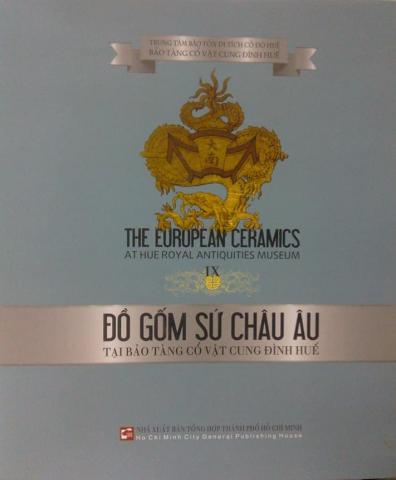 ác giả: Bảo tàng cổ vật cung đình Huế - Trung tâm Bảo tồn di tích cố đô Huế
ác giả: Bảo tàng cổ vật cung đình Huế - Trung tâm Bảo tồn di tích cố đô Huế- Nxb: Tổng hợp TP.Hồ Chí Minh
- Khổ sách: 23 x 25cm
- Số trang: 250 trang
Từ các nguồn thông tin tư liệu nước ngoài của nhà ngiên cứu Philippe Trương (một chuyên gia giám định cổ vật quốc tế, đồng thời là tác giả của nhiều bài viết, ấn phẩm về đồ gốm sứ Việt Nam đã được công bố ở Việt Nam và nước ngoài), kết hợp với kết quả khảo sát nhóm hiện vật có nguồn gốc Châu Âu tại Bảo tàng cổ vật vật cung đình Huế sẽ mang đến cho độc giả những kiến thức tổng hợp không chỉ liên quan trực tiếp đến nhóm cổ vật mà còn làm sáng tỏ mối liên hệ giữa cổ vật với phong tục tập quán, văn hóa, chính trị, ngoại giao qua từng giai đoạn lịch sử của triều Nguyễn.
Xin trân trọng giới thiệu!!
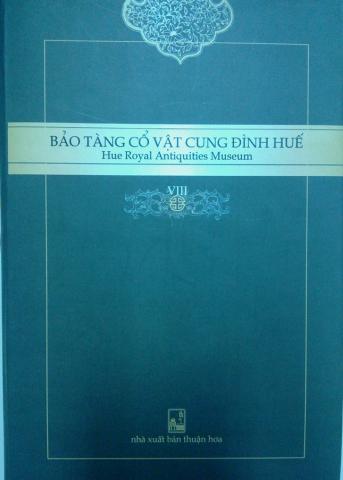 iả: Trung tâm Bảo tồn di tích cố đô Huế
iả: Trung tâm Bảo tồn di tích cố đô Huế- Nxb: Thuận Hóa - 2016
- Khổ sách: 15 x 21cm
- Số trang: 367 trang
Nội dung cuốn sách: Sau tập VII với nội dung: Văn hóa cung đình Huế qua góc nhìn cổ vật thì tập VIII này sẽ đi sâu giới hiệu bạn đọc những nghiên cứu về đồ gỗ cung đình Huế từ tư liệu đến hiện vật. Các chuyên mục: Những vấn đề chung, giới thiệu cổ vật và trao đổi nghiệp vụ - Thông tin tư liệu được trình bày trong cuốn sách này sẽ mang đến cho độc giả những kết quả nghiên cứu khá công phu về lịch sử, văn hóa triều Nguyễn của các nhà nghiên cứu, nhà sưu tầm - phục chế cổ vật cùng những kinh nghiệm nghiệp vụ của đội ngũ cán bộ ở Bảo tàng cổ vật Cung đình Huế.
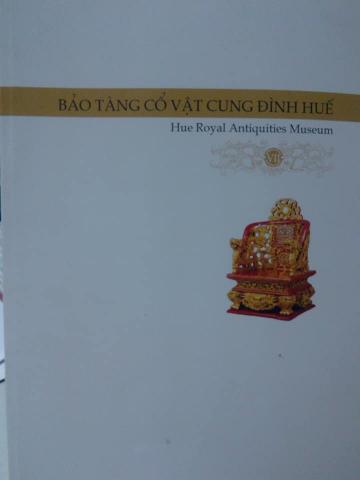 ả: Trung tâm Bảo tồn di tích cố đô Huế
ả: Trung tâm Bảo tồn di tích cố đô Huế- Khổ sách: 19 x 27cm
- Số trang: 229 trang
Nội dung cuốn sách:
Năm 2015, sách Bảo tàng cổ vật cung đình Huế - tập VII sẽ giới thiệu những vấn đề về văn hóa cung đình Huế qua góc nhìn cổ vật với các mục: Những vấn đề chung, cổ vật cung đình Huế và Trao đổi nghiệp vụ. Đây là tập hợp những kết quả nghiên cứu khá công phu và những ý kiến trao đổi từ góc độ chuyên môn của các nhà quản lý, các nhà nghiên cứu, nhà sưu tầm - phục chế cổ vật ở nhiều nơi trên cả nước cùng những kinh nghiệm nghiệp vụ của đội ngũ cán bộ ở Bảo tàng cổ vật Cung đình Huế.
Phù điêu nữ thần Durga (Mỹ Sơn, Quảng Nam, thế kỉ 10-11) bằng đá sa thạch đang được trưng bày tại bảo tàng Chăm-Đà Nẵng
Con tàu dài 23m có tuổi đời hơn 2.400 năm được tìm thấy còn nguyên vẹn dưới đáy Biển Đen.
Các nhà khảo cổ học thuộc Dự án khảo cổ hàng hải Biển Đen (BSMAP) đã tìm thấy xác tàu được cho là cổ nhất còn nguyên vẹn dưới lòng Biển Đen, tờ The Guardian ngày 23/10 đưa tin.

Con tàu vẫn còn nguyên cột buồm, bánh lái và mái chèo. (ẢNH CHỤP MÀN HÌNH THE GUARDIAN).
Xác tàu dài 23m nằm cách mặt nước khoảng 2km vẫn còn nguyên cột buồm, bánh lái và các tấm ván ngang để ngồi chèo. Giới chuyên gia cho rằng điều kiện thiếu oxy ở độ sâu đó đã giúp bảo quản con tàu còn nguyên vẹn.
Đây được cho là tàu buôn có từ thời Hy Lạp cổ đại cách đây hơn 2.400 năm, cùng loại với con tàu được vẽ trên chiếc bình sứ Siren Vase đang được trưng bày ở bảo tàng Anh.
Nhóm tìm kiếm cho biết sẽ để nguyên con tàu ở đó và chỉ lấy một mẩu nhỏ để xác định niên đại tại Đại học Southampton (Anh). Kết quả cho thấy đây là xác tàu cổ nhất còn nguyên vẹn mà loài người tìm thấy, theo BSMAP.
Giáo sư khảo cổ hàng hải Jon Adams thuộc BSMAP cho rằng một con tàu thời cổ đại được tìm thấy nguyên vẹn ở độ sâu đó là điều chưa từng được nghĩ đến. “Phát hiện này sẽ thay đổi quan niệm của chúng ta về nghề đóng tàu và hàng hải thời cổ đại”, ông Adams nói. Dữ liệu về khám phá mới của BSMAP sẽ được công bố tại hội nghị ở London trong tuần này.
(Theo Thanh niên)
Theo đó Phòng Tổ chức - Hành chính, Phòng QLKH-KHTC&HTQT, Ban chủ nhiệm dự án chịu trách nhiệm tổ chức lựa chọn nhà thầu đảm bảo tuân thủ các quy định hiện hành của Nhà nước. Nội dung chi tiết vui lòng xem file đính kèm.
Nội dung cuốn sách tập hợp 305 bài viết của các tác giả khác nhau ở các cơ quan khác nhau như các bảo tàng, sở Văn hóa, Viện nghiên cứu, trung tâm bảo tồn di tích .v.v. , các cá nhân trong cả nước về những tổng kết, đánh giá và thông báo những phát hiện mới về khảo cổ học trong năm 2017.
Xin trân trọng giới thiệu đến đông đảo các nhà nghiên cứu và những ai quan tâm.
Xin trân trọng giới thiệu!
Viện Hàn lâm khoa học xã hội Việt Nam
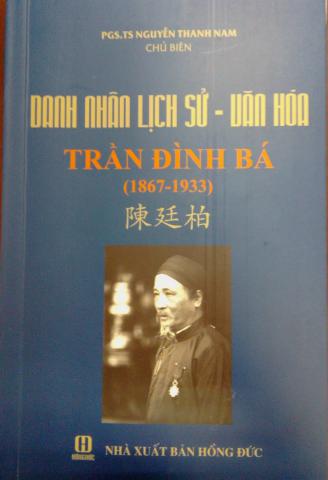 .TS Nguyễn Thanh Nam (Chủ biên)
.TS Nguyễn Thanh Nam (Chủ biên)- Nxb: Hồng Đức - 2018
- Khổ sách: 16 x 24cm
- Số trang: 303 trang
Nội dung cuốn sách: Cuốn sách viết về cuộc đời, con người, sự nghiệp của danh nhân lịch sử văn hóa Trần Đình Bá. Ông sinh năm Đinh Mão (tức 1867) dưới thời vua Tự Đức, có hiệu là Phước Trang, tự Tân Phủ. Ông là người ấp Phước Tự, thôn Hiền Lương, tổng Hiền Lương, huyện Phong Điền, phủ Thừa Thiên (nay là thôn Hiền Lương, xã Phong Hiền, huyện Phong Điền, tỉnh Thừa Thiên Huế). Ông nội của Trần Đình Bá là cụ Trần Văn Đắc làm võ quan, trật Tòng Thất phẩm, chức Tinh binh Đội trưởng thuộc Bộ Công dưới triều Tự Đức. Năm 1897 (Đinh Dậu) dưới thời vua Thành Thái, Trần Đình Bá dự thi Hương, đỗ cử nhân. Năm sau, 1898 (Mậu Tuất) ông dự thi Hội và đỗ Phó Bảng. Ông mất năm 1933, hưởng thọ 67 tuổi.
Sách gồm 2 phần: 1/Trần Đình Bá - Quê hương, thân thế và sự nghiệp; 2/Những đánh giá khách quan và di sản vật thể còn lại, tập hợp những bài viết khác nhau của nhiều tác giả khác nhau
Xin trân trọng giới thiệu!
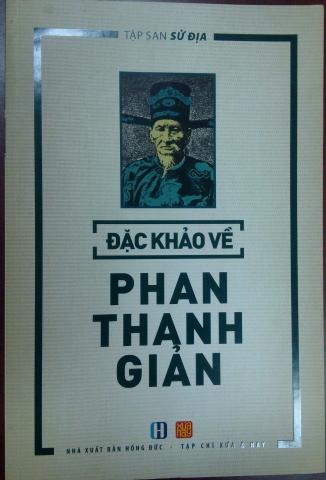 Nguyễn Thế Anh, Bửu Cầm, Phan Khoang và nhiều tác giả khác.
Nguyễn Thế Anh, Bửu Cầm, Phan Khoang và nhiều tác giả khác.- Nxb: Hồng Đức - 2016
- Khổ sách: 16 x 24cm
- Số trang: 255 trang
Tạp chí Xưa và Nay đã phối hợp với Nhà xuất bản Hồng Đức xuất bản số đặc khảo “Đặc khảo về Phan Thanh Giản” với mục đích ghi nhận lại những đóng góp, dấu ấn một thời hoạt động sôi nổi của một số sinh viên, trí thức Sài Gòn; đồng thời cung cấp tài liệu tham khảo bổ ích cho các nhà khoa học đang quan tâm nghiên cứu về lịch sử, địa lý, văn hóa Việt Nam.
Nội dung cuốn sách viết về con người, cuộc đời hoạt động của Phan Thanh Giản với nhiều bài viết khác nhau của các tác giả khác nhau.
1/ Phan Thanh Giản đi sứ ở Paris; 2/ Phan Thanh Giản dưới mắt người Pháp qua vài tài liệu; 3/Một nghi vấn về tập Tây Phù Nhật ký; 4/ Kinh lược đại thần Phan Thanh Giản với sự chiếm cứ ba tỉnh miền Tây; 5/ Chung quanh cái chết và trách nhiệm của Phan Thanh Giản trước các biến cố của Nam Kỳ cuối thế kỷ XIX; 6/ Cuộc đời Phan Thanh Giản; 7/ Cuộc đời hoạt động của Phan Thanh Giản; 8/ Nhân cuộc du xuân may gặp kho tàng quý giá về cụ Phan Thanh Giản; 9/ Thái độ của triều đình Huế đối với Phan Thanh Giản từ vua Tự Đức đến vua Đồng Khánh. Và một số các tác phẩm được dịch.
Xin trân trọng giới thiệu!
|
Chiều 29-9, tại TP Huế (Thừa Thiên - Huế), Viện Khảo cổ học - Viện Hàn lâm Khoa học xã hội Việt Nam phối hợp với Trung tâm Bảo tồn di tích cố đô Huế tiến hành khai mạc Hội nghị thông báo Khảo cổ học toàn quốc lần thứ 53 - năm 2018. |
|
Đến dự hội nghị có các lãnh đạo UBND tỉnh Thừa Thiên - Huế; Viện Hàn lâm Khoa học xã hội Việt Nam, Viện Khảo cổ học cùng đông đảo các nhà nghiên cứu khoa học, đại diện lãnh đạo các bảo tàng trong toàn quốc. Theo tổng kết của PGS.TS Bùi Văn Liêm, Hội nghị năm nay đã nhận được trên 356 bài viết theo các chủ đề của 4 tiểu ban: Khảo cổ học tiền sử, Khảo cổ học lịch sử, Khảo cổ học Champa – Óc Eo, Khảo cổ học dưới nước. Đây là những phát hiện mới về di tích, di vật cũng như những nghiên cứu chuyên sâu xuyên suốt từ thời tiền sử đến lịch sử. Phát biểu khai mạc hội nghị, GS.TS Phạm Văn Đức, Phó Chủ tịch Viện Hàn lâm Khoa học xã hội Việt Nam khẳng định: Hội nghị lần này là diễn đàn khoa học để các nhà khoa học chia sẻ các kết quả nghiên cứu, đồng thời là cơ hội để các nhà khoa học, nhất là nhà khoa học trẻ tiếp cận, học hỏi các thế hệ đi trước nhằm hoàn thiện năng lực nghiên cứu khoa học của mình.
Tại hội nghị lần này, nhiều phát hiện về khảo cổ học được công bố như: kết quả khai quật khảo cổ học tại di tích sơ kỳ Đá cũ ở thị xã An Khê (tỉnh Gia Lai); phát hiện mũi khoan đá ở Hoa Lộc; những kết quả phân tích của chương trình hợp tác ADN trong khảo cổ học giữa Việt Nam và Đan Mạch; phát hiện hang động núi lửa ở Tây Nguyên có con người cư trú…
Sau phiên khai mạc, các nhà khoa học đã trình bày và thảo luận tại các phòng họp tiểu ban. Hội nghị sẽ diễn ra trong hai ngày 29-30/9. 16h30-17h chiều 30/9, Hội nghị sẽ bế mạc. |
| Tin, ảnh: Nguyễn Thơ Đình |

